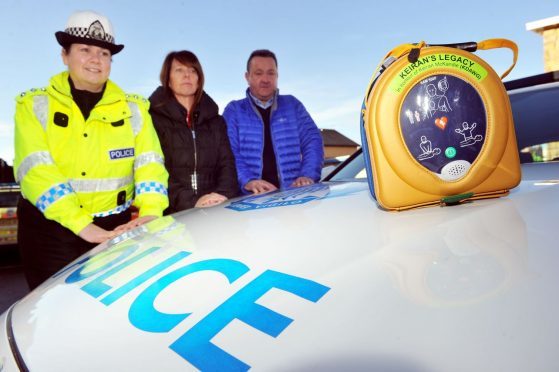A tragedy-stricken Moray family fears that lives could be lost because of police “bureaucracy” holding up the expansion of a life-saving scheme.
Gordon and Sandra McKandie raised thousands of pounds to install defibrillators in police cars after 16-year-old Keiran was killed in a crash while out riding his bike.
The Miltonduff teenager lay in the road for almost 30 minutes before an ambulance reached him.
In an attempt to save others in need, Mr and Mrs McKandie resolved to kit out police vehicles with vital equipment so that officers can treat casualties quickly if they arrive first on the scene, The Highlands and Islands division has now confirmed that it will introduce eight devices paid for by the family’s fundraising.
But Mrs McKandie said the very slow progress in getting the scheme extended across the country was proving very frustrating.
The first 10 machines, which use electricity to restart hearts suffering from cardiac arrest, were installed in police vehicles across the north-east last February.
Just two months later one was used to resuscitate a 52-year-old man near Peterhead.
Mrs McKandie hoped the scheme would be rolled out nationwide after the six-month trial period ended last August.
But now, another six months on from that point, she is growing exasperated that things are not moving much faster.
The Miltonduff resident said: “I think it’s bureaucracy, simple as that.
“People have been having meetings about meetings about meetings and nobody is making a decision.
“There are potentially lives that could be being saved in other parts of the country right now while we’re being held up.
“We’ve got the money ready to go for the Highlands, that’s sitting there. It’s very good news from our perspective that the police has confirmed the roll-out there.
“It’s quite frustrating that it’s taking this long after the pilot, we’re ready to go and get this rolled out everywhere, it shouldn’t be getting caught up in bureaucracy and politics and potentially getting in the way of saving someone else’s life.
“At the end of the day you can’t put a price on a life. Nothing should get in the way of all the emergency services working together to achieve that goal.”
It is understood that the defibrillators donated last year have been used in Elgin, Forres, Maud, Inverurie, Ellon, Peterhead, St Cyrus and Laurencekirk.
Road Policing Superintendent Louise Blakelock said: “The McKandie family has fundraised tirelessly and continue to do so to raise money for defibrillators. This life-saving equipment will help others and maintain Keiran’s Legacy.
“The 10 defibrillators generously donated by the McKandie family are now part of the equipment in our road policing response cars in the north-east, to be used by our officers to provide enhanced medical aid if required when they are first on the scene of serious incidents. Annual refreshment training has been delivered recently to maintain our skills.
“The pilot scheme in the north-east resulted in at least one life being saved. DCC Johnny Gwynne has now agreed to extend the project to road policing crews serving the Highland and Islands police area. We will continue to work with the charity and our partners, including the Scottish Ambulance Service, to take forward the ambitions of Keiran’s Legacy.”
Keiran McKandie was killed after being struck by a car while cycling on the outskirts of Elgin in March 2016.
Police who were sent to the B9010 near Craigend did not have the equipment to provide treatment for the Elgin Academy pupil and it took 27 minutes for an ambulance to arrive.
All of the defibrillators have been branded with “KDAWG” – a nickname given to Keiran by his friends.
